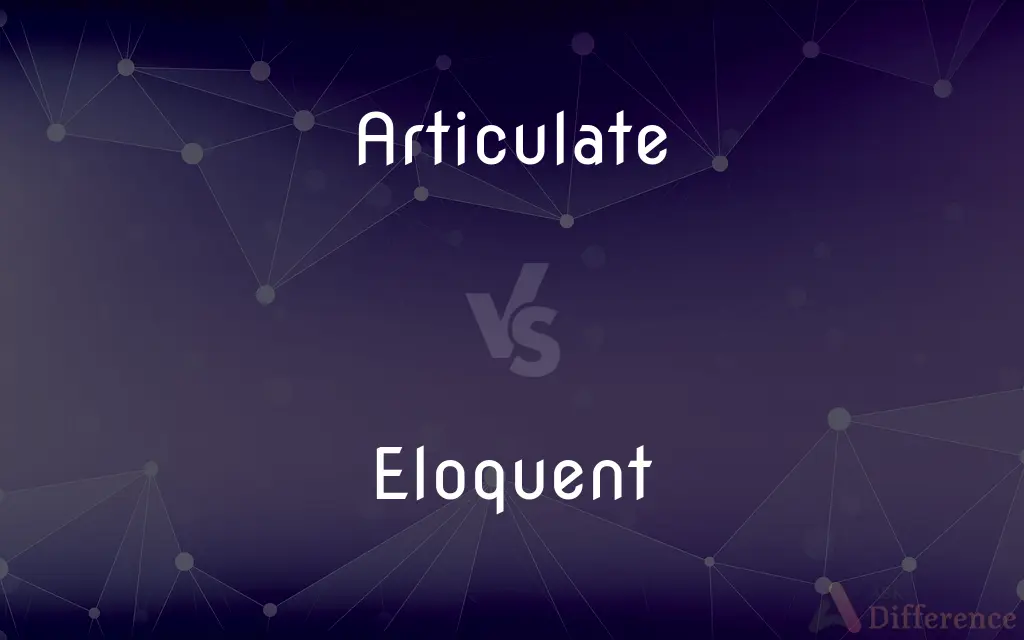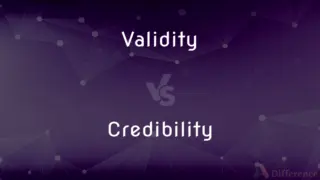Articulate vs. Eloquent — What's the Difference?
Edited by Tayyaba Rehman — By Fiza Rafique — Updated on April 4, 2024
Articulate focuses on the clarity and precision in expressing ideas, while eloquent emphasizes persuasive, vivid, or expressive language.

Difference Between Articulate and Eloquent
Table of Contents
ADVERTISEMENT
Key Differences
Articulate communication is defined by the ability to express thoughts and ideas clearly and effectively, making complex information accessible to others. This often involves using precise language and structuring arguments or narratives in a logical manner. On the other hand, eloquence goes beyond clarity to include the art of persuasive and moving expression, often employing rhetorical flourishes and a rich vocabulary to inspire or influence listeners or readers.
Articulate speakers or writers are appreciated for their capacity to break down difficult concepts into understandable chunks, ensuring that their audience can follow along without confusion. Whereas eloquent individuals might captivate their audience with their command over language, utilizing metaphor, analogy, and emotion to convey their points in a memorable way.
Being articulate is particularly valued in academic, technical, and professional settings where the primary goal is to inform or instruct with precision. Eloquent expression, however, is often sought after in leaders, politicians, and public speakers, where the objective includes motivating or persuading others.
An articulate person might be seen as a clear thinker, someone who can distill complex ideas into essential truths that are easily understood. Eloquent people, by contrast, are often viewed as gifted storytellers, able to weave narrative and emotion into their discourse, thus engaging their audience on a deeper level.
In everyday conversation, articulate speech helps in making sure that messages are conveyed without misunderstanding, emphasizing efficiency and directness. Eloquent speech, however, might enhance the conversation with its beauty and emotional depth, making the experience more engaging and memorable for those involved.
ADVERTISEMENT
Comparison Chart
Definition
Clear, effective communication of ideas
Persuasive, vivid, and expressive language
Primary Focus
Clarity and precision
Expressiveness and persuasion
Preferred Context
Academic, technical, professional
Leadership, politics, public speaking
Perception
Clear thinker, logical
Gifted storyteller, emotionally engaging
Effect on Audience
Understandable, accessible information
Moved, persuaded, emotionally touched
Compare with Definitions
Articulate
Speaking in a way that is easily understood.
He was articulate in explaining the software features.
Eloquent
Marked by forceful and fluent expression.
She wrote an eloquent essay on human rights.
Articulate
Characterized by the use of clear, expressive language.
Her articulate response impressed the interviewers.
Eloquent
Persuasive and moving, especially in speech.
The leader's eloquent appeal unified the community.
Articulate
Having the ability to put thoughts into words easily.
The author is articulate when discussing complex topics.
Eloquent
Able to express emotions and thoughts in a compelling manner.
His eloquent tribute touched everyone's hearts.
Articulate
Able to express ideas clearly and effectively.
She gave an articulate presentation on climate change.
Eloquent
Eloquent speakers often use rhetoric to enhance their message.
The advocate was eloquent in defending civil liberties.
Articulate
Clear articulation involves precise pronunciation and choice of words.
The teacher's articulate instructions made the experiment easy to follow.
Eloquent
Having or showing the ability to use language clearly and effectively.
His eloquent speech moved the audience.
Articulate
Composed of distinct, meaningful syllables or words
Articulate speech.
Eloquent
Capable of or characterized by eloquence
An eloquent speaker.
An eloquent sermon.
Articulate
Expressing oneself easily in clear and effective language
An articulate speaker.
Eloquent
Fluently persuasive and articulate.
An eloquent writer
Articulate
Characterized by the use of clear, expressive language
An articulate essay.
Eloquent
Effective in expressing meaning by speech.
An eloquent article
Articulate
Having the power of speech.
Eloquent
Having the power of expressing strong emotions or forcible arguments in an elevated, impassioned, and effective manner; as, an eloquent orator or preacher.
O Death, all-eloquent! You only proveWhat dust we dote on when 't is man we love.
Articulate
(Biology) Consisting of sections united by joints; jointed.
Eloquent
Adapted to express strong emotion or to state facts arguments with fluency and power; as, an eloquent address or statement; an eloquent appeal to a jury.
Articulate
To pronounce distinctly and carefully; enunciate.
Eloquent
Expressing yourself readily, clearly, effectively;
Able to dazzle with his facile tongue
Silver speech
Articulate
To utter (a speech sound) by making the necessary movements of the speech organs.
Articulate
To express in coherent verbal form
Couldn't articulate my fears.
Articulate
To fit together into a coherent whole; unify
A plan to articulate nursing programs throughout the state.
Articulate
To convert (a student's credits at one school) to credits at another school by comparing the curricula.
Articulate
(Biology) To unite by forming a joint or joints.
Articulate
(Architecture) To give visible or concrete expression to (the composition of structural elements)
A spare design in which windows and doors are barely articulated.
Articulate
To speak clearly and distinctly.
Articulate
To utter a speech sound.
Articulate
(Biology) To form a joint; be jointed
The thighbone articulates with the bones of the hip.
Articulate
Clear; effective.
Articulate
Speaking in a clear and effective manner.
She’s a bright, articulate young woman.
Articulate
Consisting of segments united by joints.
The robot arm was articulate in two directions.
Jointed articulate animals
Articulate
Distinctly marked off.
An articulate period in history
Articulate
(obsolete) Expressed in articles or in separate items or particulars.
Articulate
Related to human speech, as distinct from the vocalisation of animals.
Articulate
(zoology) An animal of the subkingdom Articulata.
Articulate
(transitive) To make clear or effective.
Articulate
(ambitransitive) To speak clearly; to enunciate.
I wish he’d articulate his words more clearly.
Articulate
(transitive) To explain; to put into words; to make something specific.
I like this painting, but I can’t articulate why.
Articulate
(transitive) To bend or hinge something at intervals, or to allow or build something so that it can bend.
An articulated bus
Articulate
To attack a note, as by tonguing, slurring, bowing, etc.
Articulate that passage heavily.
Articulate
To form a joint or connect by joints
The lower jaw articulates with the skull at the temporomandibular joint.
Articulate
(obsolete) To treat or make terms.
Articulate
Expressed in articles or in separate items or particulars.
Articulate
Jointed; formed with joints; consisting of segments united by joints; as, articulate animals or plants.
Articulate
Distinctly uttered; spoken so as to be intelligible; characterized by division into words and syllables; as, articulate speech, sounds, words.
Total changes of party and articulate opinion.
Articulate
An animal of the subkingdom Articulata.
Articulate
To utter articulate sounds; to utter the elementary sounds of a language; to enunciate; to speak distinctly.
Articulate
To treat or make terms.
Articulate
To join or be connected by articulation.
Articulate
To joint; to unite by means of a joint; to put together with joints or at the joints.
Articulate
To draw up or write in separate articles; to particularize; to specify.
Articulate
To form, as the elementary sounds; to utter in distinct syllables or words; to enunciate; as, to articulate letters or language.
Articulate
To express distinctly; to give utterance to.
Luther articulated himself upon a process that hand already begun in the Christian church.
To . . . articulate the dumb, deep want of the people.
Articulate
Provide with a joint;
The carpenter jointed two pieces of wood
Articulate
Put into words or an expression;
He formulated his concerns to the board of trustees
Articulate
Speak, pronounce, or utter in a certain way;
She pronounces French words in a funny way
I cannot say `zip wire'
Can the child sound out this complicated word?
Articulate
Express or state clearly
Articulate
Expressing yourself easily or characterized by clear expressive language;
Articulate speech
An articulate orator
Articulate beings
Articulate
Consisting of segments held together by joints
Common Curiosities
What makes someone articulate?
The ability to express thoughts clearly and effectively, often with precision and coherence.
Is articulation more important than eloquence?
Importance varies by context: articulation is key in settings prioritizing clarity, while eloquence shines in persuasive or inspirational roles.
What are the signs of an eloquent speaker?
Use of vivid language, rhetorical devices, and the ability to deeply engage and move the audience.
How does one improve articulation?
Practice, clear thinking, and structuring ideas logically can improve articulation.
In what way do articulate and eloquent writing differ?
Articulate writing focuses on clarity and precision, while eloquent writing emphasizes beauty, persuasive power, and emotional depth.
Can eloquence be learned?
Yes, eloquence can be developed through practice, study of language and rhetoric, and exposure to eloquent speech and writing.
Can an articulate person also be eloquent?
Yes, someone can be both articulate in clarity and eloquent in expressiveness and persuasion.
How does eloquence affect communication?
Eloquence enhances communication by making it more persuasive, memorable, and emotionally resonant.
Why is being articulate important?
Being articulate is crucial for clear understanding, especially in educational, technical, and professional contexts.
How do articulate and eloquent speeches impact audiences differently?
Articulate speeches make complex ideas accessible, while eloquent speeches aim to inspire, persuade, and evoke emotional responses.
Is eloquence always beneficial in communication?
While generally advantageous, excessive eloquence might obscure clarity or seem pretentious in certain contexts.
What role does vocabulary play in being articulate or eloquent?
A broad vocabulary aids in expressing ideas clearly (articulate) and in a more vivid and persuasive manner (eloquent).
Are there specific exercises to become more eloquent?
Reading widely, practicing public speaking, and studying rhetorical techniques can help one become more eloquent.
What challenges do articulate individuals face in communication?
They may struggle with maintaining simplicity in complex discussions or ensuring engagement in more casual conversations.
Does being eloquent require natural talent?
While some may have a natural aptitude, eloquence can be honed through practice and learning.
Share Your Discovery

Previous Comparison
Validity vs. Credibility
Next Comparison
Review vs. VerifyAuthor Spotlight
Written by
Fiza RafiqueFiza Rafique is a skilled content writer at AskDifference.com, where she meticulously refines and enhances written pieces. Drawing from her vast editorial expertise, Fiza ensures clarity, accuracy, and precision in every article. Passionate about language, she continually seeks to elevate the quality of content for readers worldwide.
Edited by
Tayyaba RehmanTayyaba Rehman is a distinguished writer, currently serving as a primary contributor to askdifference.com. As a researcher in semantics and etymology, Tayyaba's passion for the complexity of languages and their distinctions has found a perfect home on the platform. Tayyaba delves into the intricacies of language, distinguishing between commonly confused words and phrases, thereby providing clarity for readers worldwide.














































